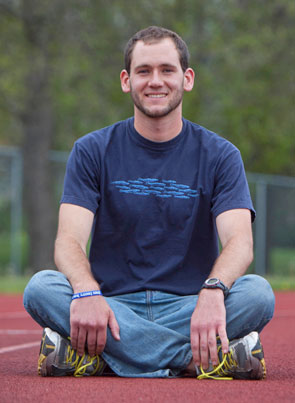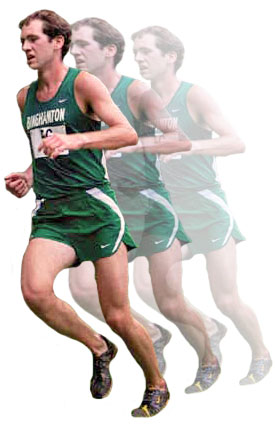Alumni Profiles is an ongoing series highlighting successful graduates who, with a SUNY education, achieved interesting and influential careers.
 Craig Coon is a successful student-turned-engineer and avid runner. Coon is best known for his stunning finishes in the Boston Marathon (28th overall), the Lake Placid Iron Man (2nd in age group), and winning the Lehigh Valley Health Network Marathon, to name a few. Coon was a runner from an early age, but refined his athleticism while a student at Binghamton University.
Craig Coon is a successful student-turned-engineer and avid runner. Coon is best known for his stunning finishes in the Boston Marathon (28th overall), the Lake Placid Iron Man (2nd in age group), and winning the Lehigh Valley Health Network Marathon, to name a few. Coon was a runner from an early age, but refined his athleticism while a student at Binghamton University.
Coon was a captain on the 2009 Binghamton Men’s Cross Country Team that won the America East championship as well as the 2010 runner-up squad. He was also a track & field captain of the 2009 Binghamton Track & Field Squad that was the runner up at both the conference indoor and outdoor meet. He now works for a private engineering firm in Upstate New York while he trains for his next race.
1. Do you identify a relationship between running and everyday life? What are your goals in running right now?
Running has always been a release from everyday life for me; in fact without running, I feel I would not be successful. I have always had running as an outlet for the highs and lows of life giving me the ability to appreciate my accomplishments and digest any obstacles. As well, with running there have been struggles including injuries as well as remarkable accomplishments including being a part of the first Binghamton Cross Country Conference Championship team.
I see running as a metaphor to life because running every day is not always exciting or life changing but there are moments that can be as a result of working hard each day when it may just feel like a grind. Going through life can at times be similar; if you don’t look for a special moment in each day then life can feel like a grind but it is in finding and appreciating the small moments of each day that lead to a happy life.
 My current running goals are under evaluation at this time. While I am able to manage my time to get runs in I, like most athletes, always would rather get more training time in. I just accomplished a couple major milestones with quality races at the Boston Marathon and the Ironman World Championships. I now have a big hole to fill but am looking forward to trying to improve my personal best in the marathon hopefully competing in a mid-size to major race in the fall of 2013. I am currently enjoying my endurance base building stage but am looking forward to getting into racing shape for shorter distances this spring and summer.
My current running goals are under evaluation at this time. While I am able to manage my time to get runs in I, like most athletes, always would rather get more training time in. I just accomplished a couple major milestones with quality races at the Boston Marathon and the Ironman World Championships. I now have a big hole to fill but am looking forward to trying to improve my personal best in the marathon hopefully competing in a mid-size to major race in the fall of 2013. I am currently enjoying my endurance base building stage but am looking forward to getting into racing shape for shorter distances this spring and summer.
2. How do you balance your commitments? What is a typical daily routine?
While growing up, my parents always preached time management and setting academics as the highest priority. My parents worked hard to give me the opportunity to succeed by encouraging me to work hard in athletics and making sure I was keeping up with my grades as well. Using the guidance they taught me as a child, I have tried to continue to balance my time between working, my social life and running. One lesson they taught me was that if you are going to do something then it should be done to the best of your ability.
I have tried to take this lesson with me throughout life. I try to become involved in as many activities as I can while also not committing to anything which I cannot put my all into. It is important to give enough time to each activity because neglecting one aspect will have detrimental effects on other parts of life. This is why I try to put work first making sure I am prepared for each day; however I also feel it is important to know when to leave work at work and relax with friends and family. With this philosophy I have found that I can manage the running and social realms better.
A typical day for me involves an early start with a run followed by breakfast. The early run helps loosen the body up and also jump starts me mentally and physically. After breakfast, it is off to work. When work is over I usually try to go to the gym or come home and prepare dinner. I find that either cooking or working out after work can help relieve any stress that may have built up and both activities are positive stress relief outlets. After dinner I will usually try to relax with my roommates or coworkers. I then try to get to sleep before too late because of the early start to my normal days.
3. What activities did you participate in at college that prepared you for your athletic and professional careers?
My experiences at Binghamton have molded me into the person I am today. While at Binghamton I had the opportunity to be a part of the Men’s Cross Country and Track and Field programs. Both teams were filled with motivated teammates and strong coaches. I was able to learn a great deal from my teammates on how to manage my time, working towards a universal goal and being able to rely on each other. While many people may think running is an individual sport, which at times it is, it is often your teammates who help push you and help each other get through the tough stretches.
Our coaches also expected a lot from the team both on and off the track. They held us accountable for our work in classroom expecting us to work harder in the classroom even more than on the track. Our coaches were able to push us to new levels, encouraging us to take on more responsibility including leading the younger athletes. It is through the little things that our team was able to become such a close group, pushing each other to the next level. Taking an ice bath in the middle of winter is not something a normal college student will subject themselves to and it is through these experiences that camaraderie and respect are earned. It is from the experiences I had as a member of the Cross Country and Track and Field teams that I learned about team building, fortitude and resolve.
4. Did you see yourself in the position you are now as you grew up and went to college?
I went to school for mechanical engineering because of the math and science involved in the work. Having gone to college for mechanical engineering, I was able to work a few summer internships which I found engaging and as a result I knew I wanted to work as an engineer. I also enjoy running too much to give it up which is one of the major reasons I have not stopped. I also need the mental release that comes with running, even if I were to give up racing I don’t know that I could stop running and working out completely.
Question 5: Overall, how did your college education help prepare you for life and your career?
I feel that Binghamton University taught me as many academic lessons as life lessons in preparing for life. My professors were able to teach me the material I needed for my career while reinforcing proper study habits. My professors also taught how to tackle difficult comprehensive problems while working in teams. Through my time as a student, I learned a number of life lessons as well. Some lessons need to be learned the hard way like not letting all the dishes sit in the sink for extended periods of time and other lessons can be absorbed through living with people from varying backgrounds. College taught me to become independent and that time management really is important and that houses don’t clean themselves.
6. What advice do you have to share with SUNY students?
I would have to say a simple phrase would sum up what I would recommend to other SUNY students which is Never Stop. This phrase has a lot more meaning behind it than the two simple words. I found that through school and now in the working world it is important to keep working hard, even when it feels that people are not recognizing the work you are doing or no positive results are occurring it is important to never stop and never give up.
The phrase can also relate to taking on new challenges or situations. It is important to not be afraid of the unknown, embrace it and try to better yourself through each new experience. Finally, I think everyone should hold themselves accountable. If a person can look back on any decision or moment and feel that they reacted in the best way then they should be looking back on a life well spent.
Cover Image: Jonathan Cohen, Binghamton University

